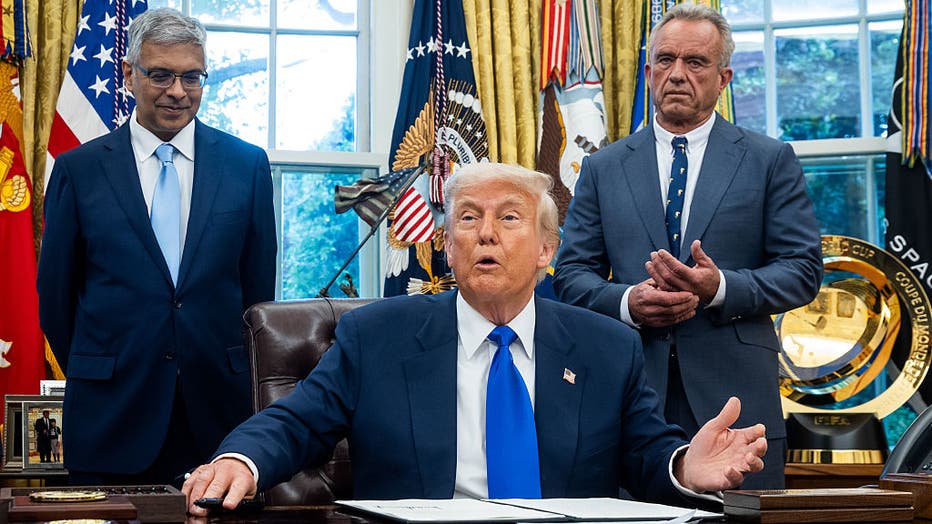What does ‘gain of function’ mean in science? Here’s what to know after Trump’s ban

President Trump signs executive orders in Oval office
President Trump signed a new batch of executive orders inside the Oval Office on Monday.
LOS ANGELES - As a controversial field of virus research returns to headlines, many Americans are wondering: what exactly is ‘gain of function’—and why did President Trump just ban federal funding for it?
The term refers to scientific studies that intentionally enhance viruses or pathogens to better understand how they might evolve. While some researchers defend the work as vital for pandemic preparedness, others warn it could increase the risk of catastrophic lab accidents. With a new executive order, the debate over safety and oversight is now front and center in Washington.
What is ‘gain of function’ research?
The backstory:
In biology, ‘gain of function’ refers to experiments that genetically alter viruses or microbes to increase their transmissibility, severity, or ability to infect new hosts. Researchers may use the method to predict how a virus could mutate and develop vaccines or treatments in advance.
Jared Auclair, a chemical biology expert at Northeastern University, described the work as a kind of scientific "war gaming." Speaking to Northeastern Global News, he said it helps scientists imagine "the worst thing we can think of and make," so they can develop a countermeasure.
Samuel Scarpino, a director at Northeastern’s AI + Life Sciences program, said the work isn’t just a scientific issue anymore. "From my perspective, this is not a science question anymore. This is a policy question," he said, adding that the key issue is whether what we learn is worth the risk.
Why is it controversial?
What they're saying:
The controversy intensified during the COVID-19 pandemic, when some speculated that the virus leaked from a lab in Wuhan, China. Although many scientists support the theory that it came from animals, the idea of lab-created or enhanced viruses captured public attention.
"Many people believe that ‘gain-of-function’ research was one of the key causes of the COVID pandemic that struck us in the last decade," White House Secretary Will Scharf told NPR. The new order, he said, gives the U.S. "powerful new tools to enforce the ban on federal funding" for such work, especially abroad.

Jayanta Bhattacharya, director of the US National Institutes of Health (NIH), from left, US President Donald Trump, and Robert F. Kennedy Jr., US secretary of Health and Human Services (HHS), during an executive order signing in the Oval Office of th (Photographer: Jim Lo Scalzo/EPA/Bloomberg via Getty Images)
Kristin Matthews, a fellow at Rice University’s Baker Institute for Public Policy, said a blanket ban could backfire. "If we ban it, the next time another COVID virus comes through we won’t have the data to quickly find new treatments, screening and even preventative measures," she told NPR.
Others see the move as necessary. "If one of these pathogens is released accidentally or if they are released deliberately, they can cause pandemics," said Richard Ebright, a Rutgers University microbiologist who supports the lab-leak theory.
What does Trump’s executive order do?
What's next:
According to the White House fact sheet, the executive order bans federal funding for ‘gain of function’ research in countries deemed to lack proper oversight, including China and Iran. It also blocks U.S. dollars from supporting foreign projects that could lead to another pandemic.
The order gives U.S. agencies the authority to review and end funding for any biological research that could pose a threat to national health, safety, or security.
Dr. Jay Bhattacharya, director of the National Institutes of Health, said the order marks a turning point. "The conduct of this research does not protect us against pandemics," he told NPR. "There’s always a danger that… it might leak out, just by accident even, and cause a pandemic."
FDA Commissioner Dr. Marty Makary was more blunt, saying: "It’s crazy to think that this entire nightmare was probably the result of some scientists messing with mother nature in a laboratory."
The administration insists the move won’t stifle innovation but will instead focus on strengthening research safeguards. Whether the new limits hinder scientific breakthroughs—or prevent future disasters—remains to be seen.
The Source: This article is based on original reporting from NPR, The Associated Press and previous FOX reporting. NPR provided direct quotes from Trump administration officials, scientists, and policy experts reacting to the executive order on ‘gain of function’ research. The Associated Press offered additional context.

